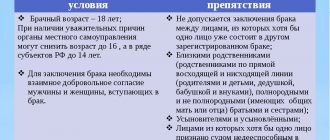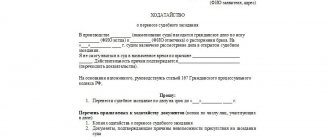In accordance with the legislation of the Russian Federation (in particular, paragraph 2 of Article 1 of the RF IC), an official marriage is recognized as a voluntary union between a man and a woman, based on monogamy, and registered with the state civil registry office (ZAGS). Marriage registration is confirmed by the issuance of a “Marriage Certificate” of the established form.
It is worth noting that, undoubtedly, in the modern world the institution of marriage has completely changed
— individual freedom of a person is the most important value, which, accordingly, entails a significant decrease in the number of registered marriages, an increase in the permissible age for marriage, an increase in the number of claims for divorce in the courts, and a significant reduction in the number of children born in marriage.
Society has also changed its attitude towards marriage - if a couple of decades ago it was very important that the relationship between a man and a woman be officially registered, today the so-called civil marriage is considered the norm.
Invalid marriage
The conclusion of a marriage union may be declared invalid by the court in the following cases:
- registering a marriage without the intention of starting a family, that is, a fictitious marriage;
- concealment of sexually transmitted diseases or HIV infection;
- lack of consent to marriage by one of the parties;
- the presence of a previously concluded and undivorced marriage.
In a marriage that has been declared invalid by a court, the rights and obligations of the spouses cannot arise.
A spouse who did not know about the presence of any obstacles to registering a marriage has the right to retain the surname chosen at the conclusion of the marriage. If one of the spouses conceals the fact of a previously concluded and undivorced marriage, based on the norms of the Family Code of the Russian Federation, the other party has the right to demand the division of property on more favorable terms. Let us note that the recognition of a marriage as invalid in no way affects the rights of children born in this marriage.
Personal rights and obligations of spouses
In accordance with paragraph 2 of Art. 10 of the Family Code of the Russian Federation, the rights and obligations of spouses arise from the moment of state registration of marriage in the registry office.
A man and woman who register a marriage with state civil registry authorities acquire personal, property and non-property rights and obligations. The personal rights of spouses include:
- voluntary choice of the surname of one of the spouses as a common one, preservation of the premarital surname or choice of a double surname (combining the surnames of both spouses);
- freedom to make decisions regarding the choice of profession and type of activity, place of residence.
Personal non-property rights and obligations of spouses include:
- making joint decisions regarding issues about family life;
- making a decision and providing consent to the adoption of a child by one of the spouses;
- decision on divorce;
- the duty not to interfere with the choice of profession and occupation.
The property rights and obligations of spouses include:
- relations in matters of property, movable and immovable property;
- alimony relations (that is, relations for the mutual maintenance of spouses and children born in marriage).
In Russian legislation, family law involves two types of property:
- premarital property, that is, owned by one of the spouses before marriage;
- property that was acquired during cohabitation.
Documents Statistics on documents and execution of orders
RUSSIAN FEDERATION
Family Code of the Russian Federation
Adopted by the State Duma on December 8, 1995
(As amended by federal laws dated November 15, 1997 No. 140-FZ, dated June 27, 1998 No. 94-FZ, dated January 2, 2000 No. 32-FZ, dated August 22, 2004 No. 122-FZ, dated December 28, 2004 No. 185-FZ, dated June 3, 2006 No. 71-FZ, dated December 18, 2006 No. 231-FZ, dated December 29, 2006 No. 258-FZ, dated July 21, 2007 No. 194-FZ, dated April 24, 2008 No. 49-FZ, dated June 30, 2008 No. 106-FZ, dated December 23, 2010 No. 386-FZ, dated May 4, 2011 No. 98-FZ, dated November 30, 2011 No. 351-FZ, dated November 30, 2011 No. 363-FZ, dated November 12, 2012 No. 183-FZ, dated 02.07.2013 No. 167-FZ, dated 02.07.2013 No. 185-FZ, dated 25.11.2013 No. 317-FZ, dated 05.05.2014 No. 126-FZ, dated 04.11.2014 No. 333-FZ, dated 20.04.2015 No. 101 -FZ, dated July 13, 2015 No. 237-FZ, dated July 13, 2015 No. 240-FZ, dated November 28, 2015 No. 358-FZ, dated December 29, 2015 No. 391-FZ, dated December 30, 2015 No. 457-FZ, dated March 28 .2017 No. 39-FZ, dated May 1, 2017 No. 94-FZ, dated October 30, 2017 No. 302-FZ, dated November 14, 2017 No. 321-FZ, dated December 29, 2017 No. 438-FZ, dated July 29, 2018 No. 224- Federal Law, dated 03.08.2018 No. 319-FZ, dated 03.08.2018 No. 322-FZ, dated 18.03.2019 No. 35-FZ, dated 29.05.2019 No. 115-FZ, dated 02.08.2019 No. 319-FZ, dated 02.12. 2019 No. 411-FZ, dated 02/06/2020 No. 10-FZ, dated 02/04/2021 No. 5-FZ, dated 07/02/2021 No. 310-FZ)
SECTION I. GENERAL PROVISIONS
CHAPTER 1. FAMILY LEGISLATION
Article 1. Basic principles of family law
1. Family, motherhood, paternity and childhood in the Russian Federation are under the protection of the state.
Family legislation is based on the need to strengthen the family, build family relationships on feelings of mutual love and respect, mutual assistance and responsibility to the family of all its members, the inadmissibility of arbitrary interference by anyone in family affairs, ensuring the unhindered exercise by family members of their rights, the possibility of judicial protection of these rights .
2. Marriages entered into only in civil registry offices are recognized.
3. The regulation of family relations is carried out in accordance with the principles of voluntary marriage between a man and a woman, equality of rights of spouses in the family, resolution of intrafamily issues by mutual consent, priority of family education of children, concern for their welfare and development, ensuring priority protection of the rights and interests of minors and disabled family members.
4. Any form of restriction of the rights of citizens upon marriage and in family relationships on the basis of social, racial, national, linguistic or religious affiliation is prohibited.
The rights of citizens in the family can be limited only on the basis of federal law and only to the extent necessary in order to protect the morals, health, rights and legitimate interests of other family members and other citizens.
Article 2. Relations regulated by family law
Family legislation establishes the procedure for the exercise and protection of family rights, the conditions and procedure for marriage, termination of marriage and recognition of its invalidity, regulates personal non-property and property relations between family members: spouses, parents and children (adoptive parents and adopted children), and in cases within the limits provided for by family legislation, between other relatives and other persons, determines the procedure for identifying children left without parental care, the forms and procedure for their placement in a family, as well as their temporary placement, including in an organization for orphans and children left behind without parental care. (As amended by Federal Law No. 457-FZ dated December 30, 2015)
Article 3. Family legislation and other acts containing norms of family law
1. In accordance with the Constitution of the Russian Federation, family legislation is under the joint jurisdiction of the Russian Federation and the constituent entities of the Russian Federation.
2. Family legislation consists of this Code and other federal laws adopted in accordance with it (hereinafter referred to as the laws), as well as laws of the constituent entities of the Russian Federation.
The laws of the constituent entities of the Russian Federation regulate family relations, which are specified in Article 2 of this Code, on issues referred to the jurisdiction of the constituent entities of the Russian Federation by this Code, and on issues not directly regulated by this Code.
The norms of family law contained in the laws of the constituent entities of the Russian Federation must comply with this Code.
3. On the basis of and in pursuance of this Code, other laws, decrees of the President of the Russian Federation, the Government of the Russian Federation has the right to adopt regulatory legal acts in cases directly provided for by this Code, other laws, decrees of the President of the Russian Federation.
Article 4. Application of civil legislation to family relations
To the property and personal non-property relations between family members named in Article 2 of this Code, which are not regulated by family legislation (Article 3 of this Code), civil legislation is applied to the extent that this does not contradict the essence of family relations.
Article 5. Application of family law and civil law to family relations by analogy
In the event that relations between family members are not regulated by family law or agreement of the parties, and in the absence of civil law norms directly regulating these relations, the norms of family and (or) civil law regulating these relations are applied to such relations, unless this contradicts their essence. similar relationships (analogy of law). In the absence of such norms, the rights and obligations of family members are determined based on the general principles and principles of family or civil law (analogy of law), as well as the principles of humanity, reasonableness and justice.
Article 6. Family legislation and international law
1. If an international treaty of the Russian Federation establishes rules other than those provided for by family law, the rules of the international treaty apply. (As amended by Federal Law No. 5-FZ dated 04.02.2021)
2. It is not permitted to apply the rules of international treaties in their interpretation that is contrary to the Constitution of the Russian Federation, as well as the fundamentals of law and order and morality. Such a contradiction may be established in the manner prescribed by federal constitutional law. (Clause introduced - Federal Law dated 04.02.2021 No. 5-FZ)
CHAPTER 2. EXERCISE AND PROTECTION OF FAMILY RIGHTS
Article 7. Exercise of family rights and fulfillment of family responsibilities
1. Citizens, at their own discretion, dispose of their rights arising from family relations (family rights), including the right to protect these rights, unless otherwise established by this Code.
The exercise by family members of their rights and the performance of their duties must not violate the rights, freedoms and legitimate interests of other family members and other citizens.
2. Family rights are protected by law, except in cases where they are exercised in conflict with the purpose of these rights.
Article 8. Protection of family rights
1. Protection of family rights is carried out by the court according to the rules of civil proceedings, and in cases provided for by this Code, by state bodies, including guardianship and trusteeship authorities. (As amended by Federal Law No. 258-FZ dated December 29, 2006)
2. Protection of family rights is carried out in the ways provided for by the relevant articles of this Code, as well as in other ways provided by law. (As amended by Federal Law No. 457-FZ dated December 30, 2015)
Article 9. Application of the limitation period in family relations
1. The limitation period does not apply to claims arising from family relations, except in cases where the period for protecting the violated right is established by this Code.
2. When applying the rules establishing the limitation period, the court is guided by the rules of Articles 198 - 200 and 202 - 205 of the Civil Code of the Russian Federation.
SECTION II. CONCLUSION AND TERMINATION OF MARRIAGE
CHAPTER 3. CONDITIONS AND PROCEDURE FOR MARRIAGE
Article 10. Marriage
1. Marriage is concluded in the civil registry office.
2. The rights and obligations of spouses arise from the date of state registration of marriage in the civil registry office.
Article 11. Procedure for concluding marriage
1. Marriage is concluded in the personal presence of the persons entering into marriage, after a month and no later than twelve months from the date of filing the application with the civil registry office on the date and time determined by the persons entering into marriage when they submit the application about marriage. (As amended by Federal Law dated August 3, 2018 No. 319-FZ)
If there are good reasons, the civil registry office at the place of state registration of marriage may allow marriage to be concluded before the expiration of a month from the date of filing the application for marriage. (As amended by Federal Law dated August 3, 2018 No. 319-FZ)
If there are special circumstances (pregnancy, birth of a child, immediate threat to the life of one of the parties and other special circumstances), the marriage can be concluded on the day the application is submitted.
2. State registration of marriage is carried out in the manner established for state registration of civil status acts.
3. The refusal of the civil registry office to register a marriage may be appealed to the court by persons wishing to get married (one of them).
Article 12. Conditions for marriage
1. To enter into a marriage, mutual voluntary consent of the man and woman entering into marriage and their attainment of marriageable age are required.
2. Marriage cannot be concluded in the presence of the circumstances specified in Article 14 of this Code.
Article 13. Marriage age
1. The age of marriage is set at eighteen years.
2. If there are valid reasons, local government bodies at the place of residence of persons wishing to get married have the right, at the request of these persons, to allow persons who have reached the age of sixteen to marry. (As amended by Federal Law No. 140-FZ dated November 15, 1997)
The procedure and conditions under which marriage, as an exception and taking into account special circumstances, may be permitted before reaching the age of sixteen years, may be established by the laws of the constituent entities of the Russian Federation.
Article 14. Circumstances preventing marriage
Marriage between:
persons of whom at least one person is already in another registered marriage;
close relatives (relatives in a direct ascending and descending line (parents and children, grandfather, grandmother and grandchildren), full and half (having a common father or mother) brothers and sisters);
adoptive parents and adopted children;
persons of whom at least one person has been declared incompetent by a court due to a mental disorder.
Article 15. Medical examination of persons entering into marriage
1. Medical examination of persons entering into marriage, as well as counseling on medical-genetic issues and family planning issues are carried out by medical organizations of the state health care system and municipal health care system at their place of residence free of charge and only with the consent of persons entering into marriage. (As amended by Federal Law No. 317-FZ dated November 25, 2013)
2. The results of the examination of a person entering into marriage constitute a medical secret and can be communicated to the person with whom he intends to marry only with the consent of the person who underwent the examination. (As amended by Federal Law No. 317-FZ dated November 25, 2013)
3. If one of the persons entering into marriage concealed the presence of a sexually transmitted disease or HIV infection from the other person, the latter has the right to apply to the court to declare the marriage invalid (Articles 27 - 30 of this Code).
CHAPTER 4. TERMINATION OF MARRIAGE
Article 16. Grounds for termination of marriage
1. A marriage is terminated due to death or due to the court declaring one of the spouses dead.
2. A marriage may be terminated by dissolution upon the application of one or both spouses, as well as upon the application of the guardian of the spouse recognized by the court as incompetent.
Article 17. Restriction of the husband’s right to file a claim for divorce
The husband does not have the right to initiate proceedings for divorce without the consent of his wife during his wife’s pregnancy and within a year after the birth of the child.
Article 18. Procedure for divorce
Divorce is carried out in the civil registry office, and in cases provided for in Articles 21 - 23 of this Code, in court.
Article 19. Divorce in the civil registry office
1. If there is mutual agreement to dissolve the marriage of spouses who do not have common minor children, the dissolution of the marriage is carried out in the civil registry office.
2. Divorce at the request of one of the spouses, regardless of whether the spouses have common minor children, is carried out at the civil registry office, if the other spouse:
declared missing by the court;
declared incompetent by the court;
convicted of committing a crime to imprisonment for a term of over three years.
3. Divorce and the issuance of a certificate of divorce are carried out by the civil registry office after a month has passed from the date of filing the application for divorce.
4. State registration of divorce is carried out by the civil registry office in the manner established for state registration of civil status acts.
Article 20. Consideration of disputes arising between spouses upon divorce in the civil registry office
Disputes about the division of the common property of spouses, the payment of funds for the maintenance of a needy disabled spouse, as well as disputes about children arising between spouses, one of whom is declared incompetent by the court or sentenced to imprisonment for a term of over three years for committing a crime (clause 2 of Article 19 of this Code) are considered in court, regardless of divorce, by the civil registry office.
Article 21. Divorce in court
1. Divorce of a marriage is carried out in court if the spouses have common minor children, except for the cases provided for in paragraph 2 of Article 19 of this Code, or in the absence of the consent of one of the spouses to dissolve the marriage.
2. Divorce of marriage is also carried out in court in cases where one of the spouses, despite the lack of objections, evades divorce from the civil registry office, including refusing to submit an application. (As amended by Federal Law No. 457-FZ dated December 30, 2015)
Article 22. Divorce of marriage in court in the absence of consent of one of the spouses to divorce
1. Divorce in court is carried out if the court determines that further life together of the spouses and the preservation of the family is impossible.
2. When considering a case of divorce in the absence of the consent of one of the spouses to dissolve the marriage, the court has the right to take measures to reconcile the spouses and has the right to postpone the hearing of the case, assigning the spouses a period for reconciliation within three months.
Divorce is carried out if measures to reconcile the spouses are unsuccessful and the spouses (one of them) insist on dissolution of the marriage.
Article 23. Divorce of marriage in court with mutual consent of the spouses to dissolve the marriage
1. If there is mutual consent to dissolve the marriage of spouses who have common minor children, as well as the spouses specified in paragraph 2 of Article 21 of this Code, the court dissolves the marriage without clarifying the reasons for the divorce. Spouses have the right to submit to the court an agreement on children, provided for in paragraph 1 of Article 24 of this Code. In the absence of such an agreement or if the agreement violates the interests of children, the court takes measures to protect their interests in the manner prescribed by paragraph 2 of Article 24 of this Code.
2. Divorce of marriage is carried out by the court no earlier than the expiration of a month from the date the spouses filed an application for divorce.
Article 24. Issues resolved by the court when making a decision on divorce
1. In the event of a judicial dissolution of a marriage, the spouses may submit for consideration by the court an agreement on which of them will live with minor children, on the procedure for paying funds for the maintenance of children and (or) a disabled needy spouse, on the amount of these funds or on the division of common property. spouses' property.
2. If there is no agreement between the spouses on the issues specified in paragraph 1 of this article, as well as if it is established that this agreement violates the interests of the children or one of the spouses, the court is obliged to:
determine which parent the minor children will live with after the divorce;
determine from which parent and in what amount alimony for their children is collected;
at the request of the spouses (one of them), to divide the property in their joint ownership;
at the request of the spouse entitled to receive maintenance from the other spouse, determine the amount of this maintenance.
3. If the division of property affects the interests of third parties, the court has the right to separate the requirement for division of property into separate proceedings.
Article 25. Moment of termination of marriage upon its dissolution
1. A marriage dissolved by the civil registry office shall be terminated from the date of state registration of the dissolution of the marriage in the civil registration book, and in the case of a divorce in court - from the day the court decision enters into legal force.
2. Divorce in court is subject to state registration in the manner established for state registration of civil status acts.
The court is obliged, within three days from the date of entry into legal force of the court decision on divorce, to send an extract from this court decision to the civil registry office at the place of state registration of the marriage.
Spouses do not have the right to enter into a new marriage until they receive a certificate of divorce from the civil registry office at the place of residence of any of them or at the place of state registration of the marriage. (As amended by Federal Law No. 183-FZ dated November 12, 2012)
Article 26. Restoration of marriage in the event of the appearance of a spouse declared dead or recognized as missing
1. In the event of the appearance of a spouse declared dead by the court or recognized by the court as missing, and the corresponding court decisions are annulled, the marriage may be restored by the civil registry office upon a joint application of the spouses.
2. The marriage cannot be restored if the other spouse has entered into a new marriage.
CHAPTER 5. NULLITY OF MARRIAGE
Article 27. Recognition of marriage as invalid
1. A marriage is invalid if the conditions established by Articles 12 - 14 and paragraph 3 of Article 15 of this Code are violated, as well as in the case of a fictitious marriage, that is, if the spouses or one of them registered a marriage without the intention of starting a family.
2. Recognition of sconces
Property relations in marriage
Common joint property is property that was acquired during a family marriage at the expense of the joint income of both spouses (Clause 2 of Article 34 of the RF IC). Jointly acquired property is considered joint property regardless of whose name it was acquired in.
O is not the basis for creating joint ownership of property.
Joint ownership does not imply the determination of shares; all participants jointly own and use common property, and dispose of it by common consent. Participants in joint ownership do not have the right to alienate or donate their share without first determining it. Only after the allocation of his share, the common joint property passes into common shared property, where each participant acquires the right to independently dispose of his share of the property: give as a gift, transfer to other persons, pledge.
A different regime for property ownership may be determined by a marriage contract, the content of which includes the rights and obligations of spouses regarding the maintenance of property and the procedure for managing family expenses. A marriage contract can be concluded not only before the marriage is registered with state authorities, but also at any time during its validity; it can be terminated or changed at any time by mutual consent of the spouses. The document must be drawn up in writing and must be certified by a notary. The validity of the marriage contract is terminated simultaneously with the termination of the existence of the marriage union.
The content of the marriage contract should not contain conditions to limit legal capacity and violate the principles of equality of men and women in an official marriage.
In addition to common property, legally married persons may have personal property, in particular:
- property that belonged to the spouse before marriage;
- property that was received during marriage as a gift or as an inheritance;
- personal items (except for luxury items and jewelry).
The spouse has the right to own, use and dispose of this property at his own discretion. However, we note that Russian legislation also provides for the fact that the other spouse invests funds in personal property, which can significantly affect the increase in its value, which, in turn, provides grounds for the court to recognize it as common joint property.
Example. One of the spouses owned an apartment before marriage; the other party invested funds for its complete overhaul. Accordingly, this property becomes the common joint property of both spouses.
How to apply through government services
Not long ago it became possible to submit documents for registration through the government services portal. To do this, go to the government services website via the Internet, register, and confirm your identity. The bride and groom register on the website.
Do you see the difference?
This method is suitable for those who want to submit an application in advance , since this can be done on the website six months before the wedding. The procedure is often started by the groom, and then he sends an invitation to the bride. After this, the bride goes to the website and completes filling out the information.
When the information is filled out, go to the tab to pay the state fee. Payment is made by credit card or from a mobile phone account. In 2021, you can get a 30% discount for those who apply online.
As a result, the state fee will be 245 rubles, and not 350, as for a personal visit to the registry office. You don’t need to go to the bank separately, and you don’t need to print out a receipt either. The government services website operates automatically.
In 5-10 minutes a confirmation message will be sent to your email. It will contain the date and time when to come to the registry office with documents. But only those who are over 18 years old can use this service.
Pros:
- You can submit an application from anywhere in the world as long as you have access to the Internet.
- Choose any registry office in Russia.
- Please indicate any available date and time.
- The application is submitted six months before the marriage is registered.
- You save time because you don’t have to stand in queues.
Minuses:
- Confirm your registration on the government services website.
- The application can only be submitted if you are 18 years of age or older.
- There must be at least 45 days before marriage registration.
- Sometimes the site does not work, technical work is being carried out. Although this can hardly be called a minus, because registry offices also have weekends and sanitary days.
Below we have made instructions to make it easier for those who have never used government services to navigate. At the first stage, select a category - marriage registration. It is located at the top right.
After that, press the blue button with the inscription - get the service.
Now fill in the information about the bride or groom. Enter your passport details here.
At the next stage, you will be asked to fill out information about your place of residence.
Now indicate the registry office where the ceremony will take place.
After this, a calendar will appear on which you indicate the date and time at which you want to register your marriage.
At this stage, indicate whether you were previously married or not.
It remains to fill in some information, such as the number of children, nationality, education and age.
Now all that remains is to send an invitation to your other half, indicate their SNILS and click the button - invite.
You can apply for marriage registration: 30 days before the wedding
Article 27 clause 2 of the law “On acts of civil status”.
Maximum period for submitting an application to the registry office: 12 months before the desired date
Article 27 clause 2 of the law “On acts of civil status”.
State fee for registering a marriage: 350 rubles when paying at a bank
clause 1 art. 333.26 Tax Code of the Russian Federation
Alimony relations
In addition to property and non-property rights, after marriage, spouses acquire a mutual obligation to provide material support to each other, which has a legal nature. In case of evasion of alimony payment, the spouse in need of financial support has the right to apply to the judicial authorities to collect it. Alimony is collected from the spouse who has the necessary means for this in the following cases:
- disability of the needy spouse;
- pregnancy and birth of a common child (within 3 years from the date of birth);
- when one of the spouses cares for a common disabled child of the 1st group since childhood.
Alimony is payable monthly in a certain amount of money. You can read about how to collect alimony in the article “Ex-husband does not pay alimony.”








